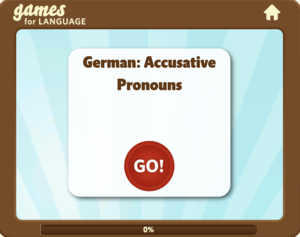
German Language Game: Accusative Pronouns
German Language Game - accusative pronouns
Level: Elementary (A2)
Playing Time: 4 minutes
Play a fun and quick German Language Game to learn and practice German Accusative Pronouns:
• mich (me)
• dich (you, familiar)
• ihn (him)
• sie (her)
• uns (us)
• euch (you-all)
• sie /Sie (them /you, formal)
1. Review the accusative pronouns with the Shootout Game.
2. Recall basic verbs that take the dative (a direct object).
3. Put together simple sentences using accusative pronouns with the Word Invader Game.
4. Choose the translation of sentences with the Deal No Deal Game.
If you understand accusative pronouns as direct objects and want to try out your German vocabulary, just play the game. Otherwise, read on below and then play.
Verbs with a Direct Object
sehen - to see
[ich sehe, du siehst, er/sie sieht, wir sehen, ihr seht, sie/Sie sehen]
kennen - to know, be acquainted with
[ich kenne, du kennst, er/sie kennt, wir kennen, ihr kennt, sie/Sie kennen]
suchen - to look for
[ich suche, du suchst, er/sie sucht, wir suchen, ihr sucht, sie/Sie suchen]
anrufen - to call (a *separable-prefix verb)
[ich rufe an, du rufst an, er/sie ruft an, wir rufen an, ihr ruft an, sie/Sie rufen an]
Separable Prefix Verbs
These are verbs that separate into two parts when used in the present and simple past tenses, as well as in the imperative.
For instance, the verb "rufen" (to call, shout) can add the separable prefix "an-".
The verb "anrufen" means "to call", specifically by telephone).
The prefix "an" goes to different positions, depending on the tense or mood of the verb. For example:
Present tense, Simple Past, and Imperative - the prefix goes at the end:
• Ich rufe dich sofort an.
(I'm calling you right away.)
• Er rief gestern sehr spät an.
(He called very late yesterday.)
• Ruf mich bitte an.
(Please call me.)
Future tense, and Present Conditional - the prefix stays attached:
• Ich werde dich heute Nachmittag anrufen.
(I'll call you this afternoon.)
• Ich würde dich gerne anrufen.
(I would like to call you.)
Perfect Tenses - the prefix stays attached to the past participle:
• Ich habe dich gestern angerufen.
(I called you yesterday.)
If you'd like a more detailed explanation of Separable and Inseparable Prefix Verbs, click here.
And, if you like our games, please SHARE us with your friends.
More Than a German Language Game
Remember: You can learn and practice German online for FREE with our 36-Scene German 1 Story: "Michael in Deutschland" and our 72-Scene German 2 Mystery Story Sequel: "Blüten in Berlin?"
("Blüten" means blossoms in German - but you'll find out that it has another, darker meaning).
Just login HERE.
And, if you have any language questions - don't hesitate to contact us!
Categories: German | Tags: German, German accusative pronouns, German language game, German pronouns
